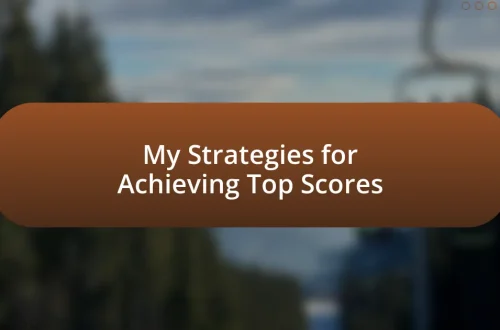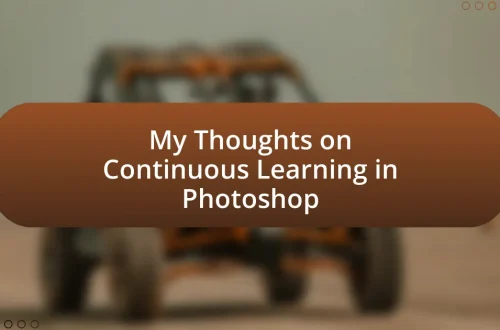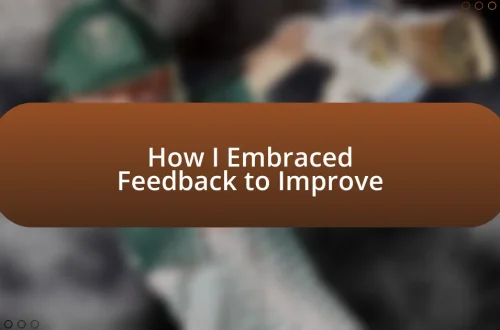
What Worked for Me in Achieving High Scores
Key takeaways:
- Setting clear and specific goals, including breaking them down into smaller milestones, enhances focus and motivation.
- Utilizing effective study techniques such as active recall, spaced repetition, and group study improves comprehension and retention of material.
- Time management strategies like using a planner and the Pomodoro Technique help to maximize productivity and reduce stress.
- Incorporating self-care and taking breaks are crucial for maintaining motivation and overall well-being during study periods.
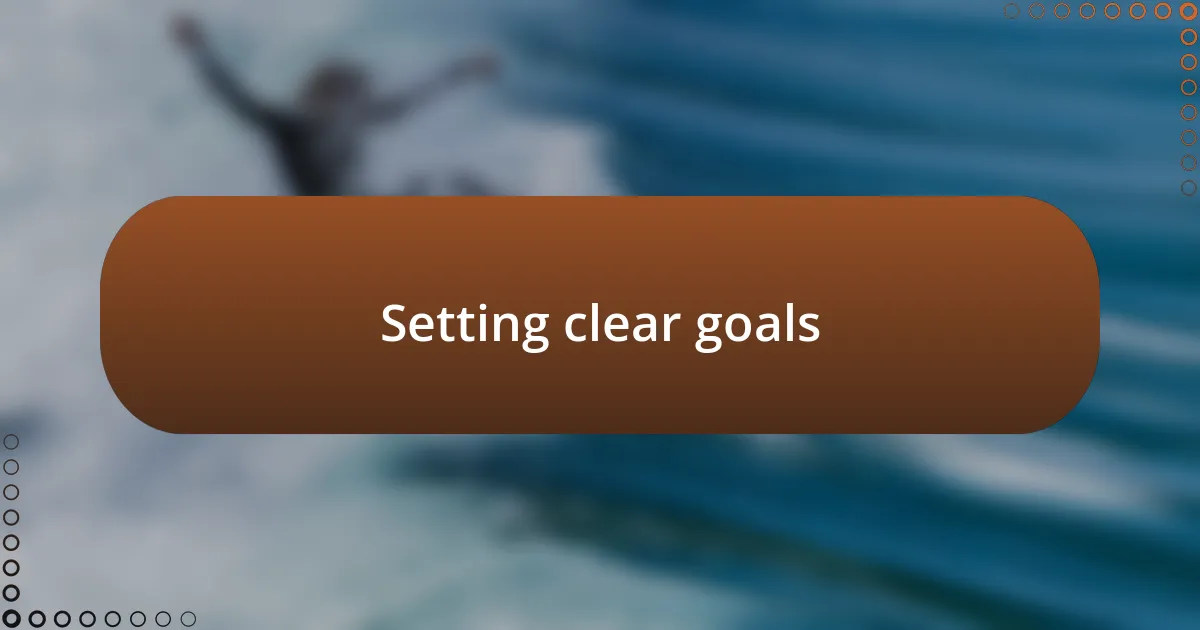
Setting clear goals
When I began my journey toward high scores, one of the first things I realized was the importance of setting clear and specific goals. Instead of just saying, “I want to do well,” I learned to articulate exactly what doing well meant for me, like aiming for a specific grade or mastering a particular subject. This precise focus not only made my path clearer but also ignited a sense of purpose in my study sessions.
One technique that worked wonders for me was breaking down my larger goals into smaller, manageable milestones. For example, instead of telling myself I needed to ace the entire semester, I targeted completing one chapter per week. This approach not only felt less overwhelming but also allowed me to celebrate small victories along the way. Have you tried setting smaller goals within your bigger objectives? It can transform your motivation and give you tangible markers of progress.
I still remember the feeling of satisfaction when I ticked off each milestone I had set for myself. That sense of achievement spurred me on and kept the momentum going even when challenges arose. Reflecting on those moments, I can’t help but think about how crucial setting clear goals was for my success. It was like having a roadmap; without it, I might have been wandering aimlessly without direction.
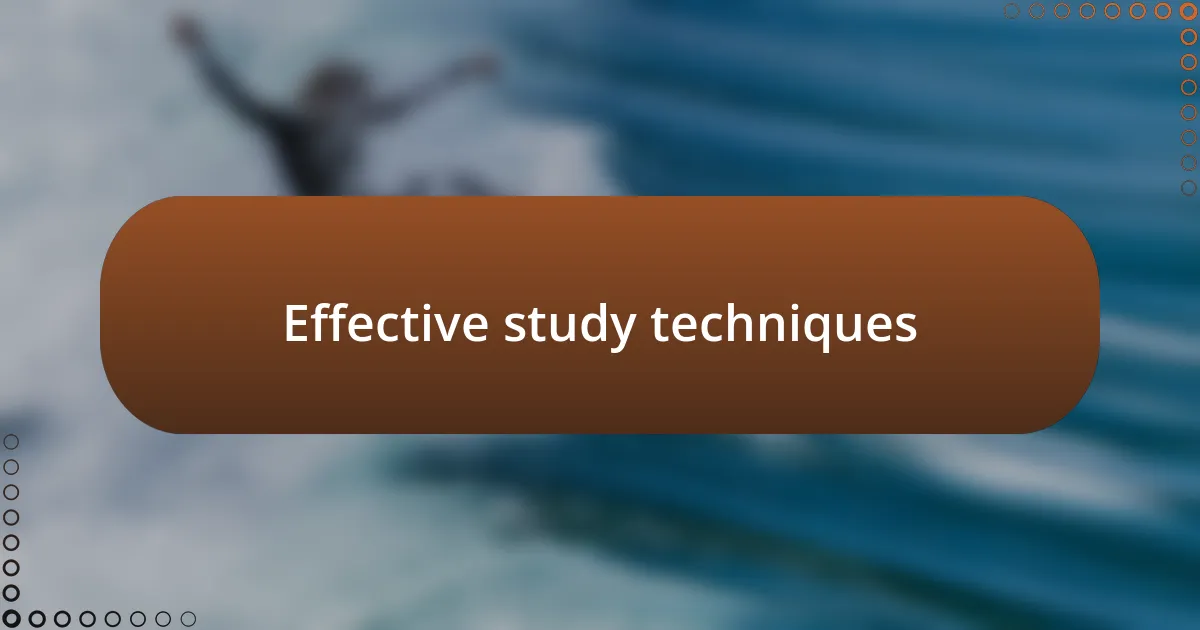
Effective study techniques
Effective study techniques are fundamental to achieving high scores. Personally, I’ve found that active engagement with the material makes a significant difference. Rather than passively reading or highlighting, I would summarize the content in my own words. This technique forces me to comprehend the material on a deeper level and has been invaluable during exam preparation.
Here are some effective study techniques I’ve employed:
- Active recall: Testing myself on the material instead of just re-reading it.
- Spaced repetition: Revisiting subjects at increasing intervals, which has helped reinforce my memory.
- Visual aids: Creating mind maps and diagrams to visualize concepts, making abstract ideas more tangible.
- Group study: Collaborating with peers to explain concepts to one another; teaching is a great way to solidify my understanding.
- Consistent routines: Studying at the same time each day created a habit that made it easier to focus.
I remember those late nights spent with friends, quizzing each other on key topics. There was something energizing about it; it transformed a solitary task into a fun, collaborative experience. This atmosphere not only lightened the burden of studying but also reinforced the material in ways I hadn’t anticipated. What techniques have you found most effective in your study routine? Sharing experiences can often lead to discovering new strategies that might work for you, too.
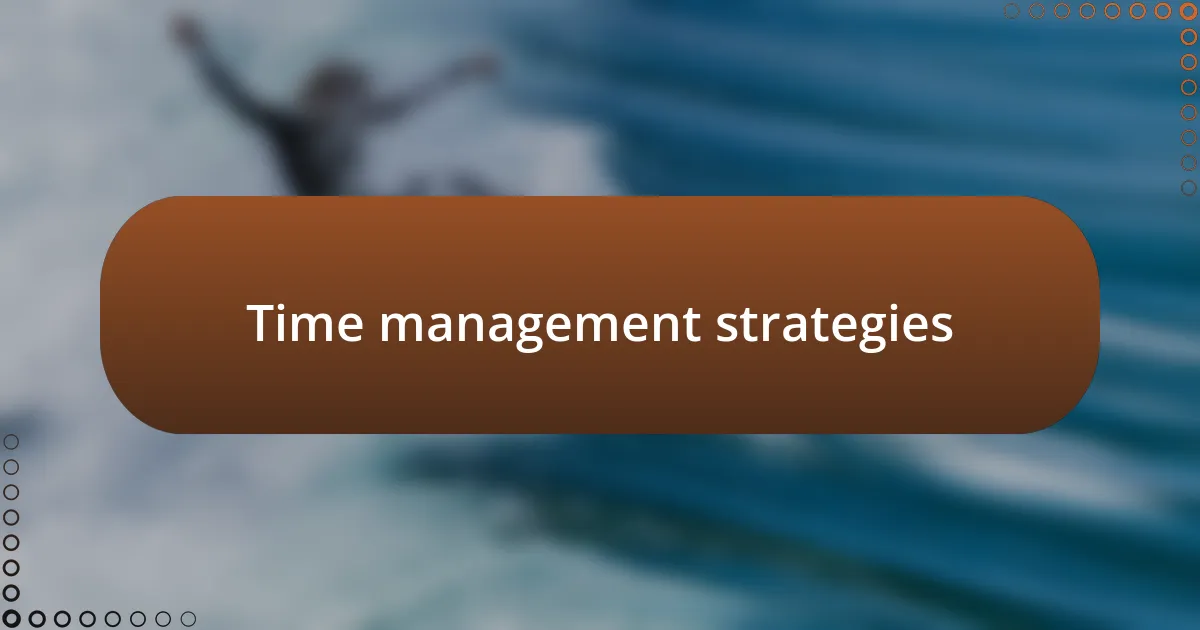
Time management strategies
Time management is crucial for academic success, and I’ve refined my approach over the years. One technique that has truly worked for me is the use of a planner. While I used to rely on my memory for assignments and deadlines, I found that writing everything down helped me visualize my workload. I remember the anxiety I faced during my first semester when everything felt overwhelming. After I started jotting down tasks in a planner, I felt a sense of control that dramatically reduced my stress.
Another strategy that significantly improved my efficiency is the Pomodoro Technique. For me, breaking my study sessions into focused 25-minute intervals, followed by a short break, maximized my productivity. Initially, I was skeptical about this method, thinking I could power through long hours of study. However, I quickly realized that by allowing myself those brief respites, I could retain information better and stay energized longer. I now look forward to those mini breaks, which feel like small rewards punctuating my study sessions.
Lastly, I find that setting clear priorities is essential. Each week, I assess my commitments and identify the most important tasks. This process not only keeps me organized but also ensures I’m not wasting precious time on less critical activities. I recall one particularly demanding week where I had multiple projects due. By prioritizing effectively, I managed to finish ahead of schedule. It’s a habit I cherish, as it often opens up extra time for relaxation or further study.
| Time Management Strategy | Description |
|---|---|
| Planner Use | Writing down tasks and deadlines helps visualize workload and reduces stress. |
| Pomodoro Technique | Studying in focused intervals with breaks increases productivity and aids retention. |
| Setting Priorities | Identifying critical tasks keeps me organized and maximizes efficiency. |

Practice exams and feedback
Taking practice exams has been a game changer for my test preparation. Initially, I would study hard but felt unprepared during actual exams, which contributed to my anxiety. I remember the first time I simulated a full-length practice test; I was shocked at how different it felt from my study sessions. The experience highlighted areas I needed to focus on and boosted my confidence. Is there anything more reassuring than taking a test when you already know what to expect?
Feedback from those practice exams plays an equally important role in my learning process. I’d often review my answers and find patterns in my mistakes, which helped me identify gaps in my knowledge. For example, after a particularly challenging math exam, I noticed I consistently struggled with specific types of problems. Diving into those areas made a significant difference in my scores later on. Have you ever felt the relief of understanding a difficult topic after addressing your mistakes?
I also learned to discuss my practice exam results with peers and mentors. Sharing insights allowed me to gain different perspectives and uncover strategies I hadn’t considered. I’ll never forget a study group session where we dissected our incorrect answers; I walked away not just with corrections but with a deeper understanding of how my classmates approached challenges. It truly reinforced the idea that collaboration can enhance individual learning, don’t you think?
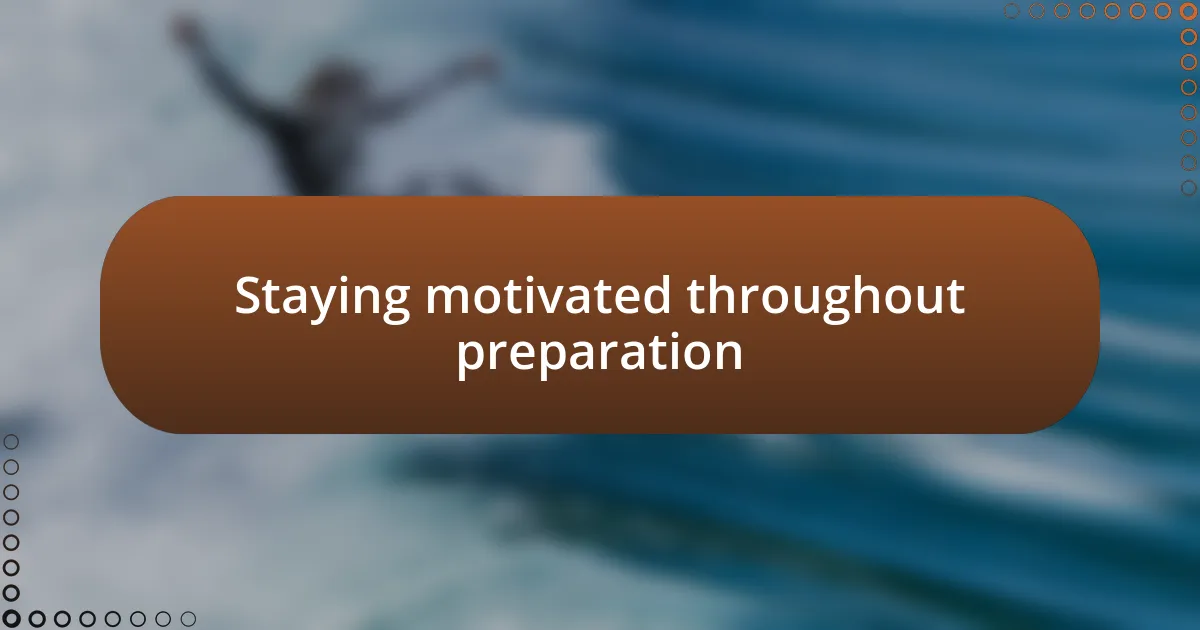
Staying motivated throughout preparation
Staying motivated during preparation can often feel like an uphill battle. I remember hitting a wall during my studies, where each day felt monotonous and progress seemed slow. It was on one particularly challenging day that I decided to reward myself for small achievements, like completing a set of practice questions. This simple strategy not only broke the routine but also added a layer of excitement, making the process feel more rewarding. Have you ever found that a small treat or acknowledgment can reignite your passion?
Incorporating breaks into my study routine made a world of difference for my motivation. After a grueling session of memorizing concepts, I’d step outside for a walk, letting the fresh air refresh my mind. I recall a moment of clarity while walking, when I realized that taking breaks not only prevented burnout but also helped me retain information more effectively. It felt rejuvenating to clear my head, and I always returned to my desk with renewed focus. Have you noticed how a little time away can shift your perspective?
Surrounding myself with supportive friends and positive reminders was crucial in maintaining my drive. I made a vision board filled with inspiring quotes and images related to my goals. I still remember glancing at it every day; those visual cues sparked motivation, especially during tough study sessions. Whenever I felt disheartened, I’d look at the board and remind myself of the bigger picture. How do you keep your goals visible and accessible?
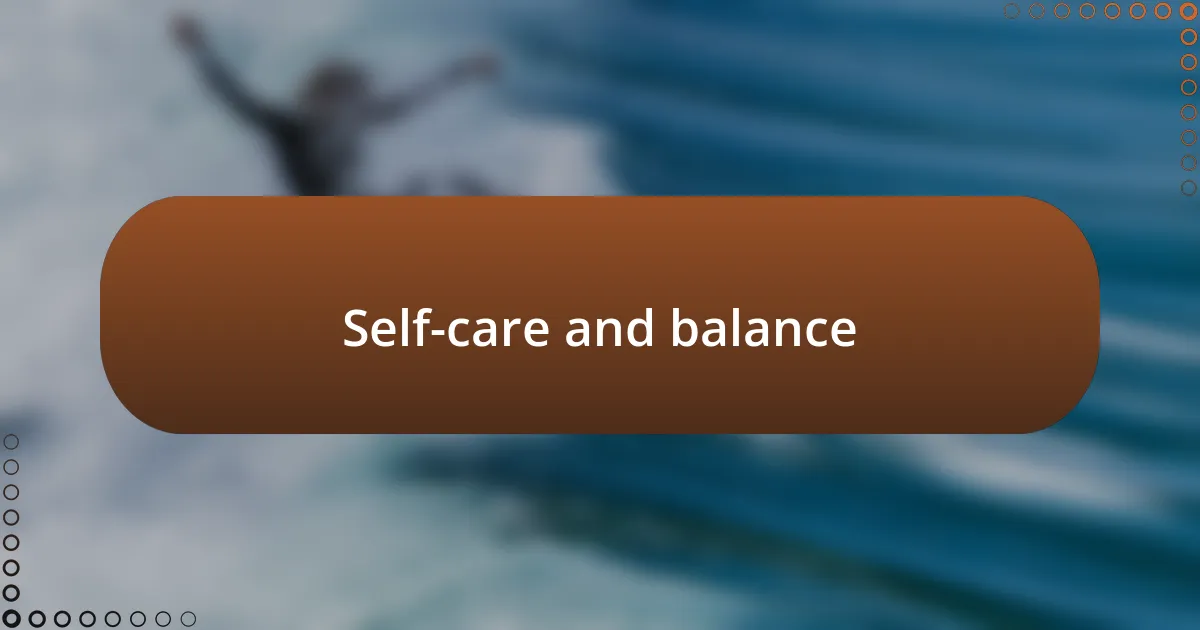
Self-care and balance
Self-care and balance are fundamental to achieving high scores and maintaining overall well-being. I vividly remember the nights when I burned the midnight oil, thinking that sacrificing sleep would lead to better results. However, I soon realized that pulling all-nighters left me feeling drained and unfocused the next day. Have you experienced that burnout after cramming for too long?
In my journey, I discovered the importance of setting aside time for activities that rejuvenated my spirit. I found solace in cooking; preparing a meal not only relieved stress but also allowed me to indulge my creativity. Each time I chopped vegetables or stirred a pot, I felt a wave of calm wash over me, making me more capable of tackling my studies afterward. Have you found a hobby that helps you unwind?
Balancing study time with self-care turned my anxiety into motivation. I remember scheduling yoga sessions after long study blocks, and those moments on the mat helped ground me. Stretching my body and focusing on my breath shifted my mindset, allowing me to return to my work with a clearer head. How do you find your center when the pressure mounts?
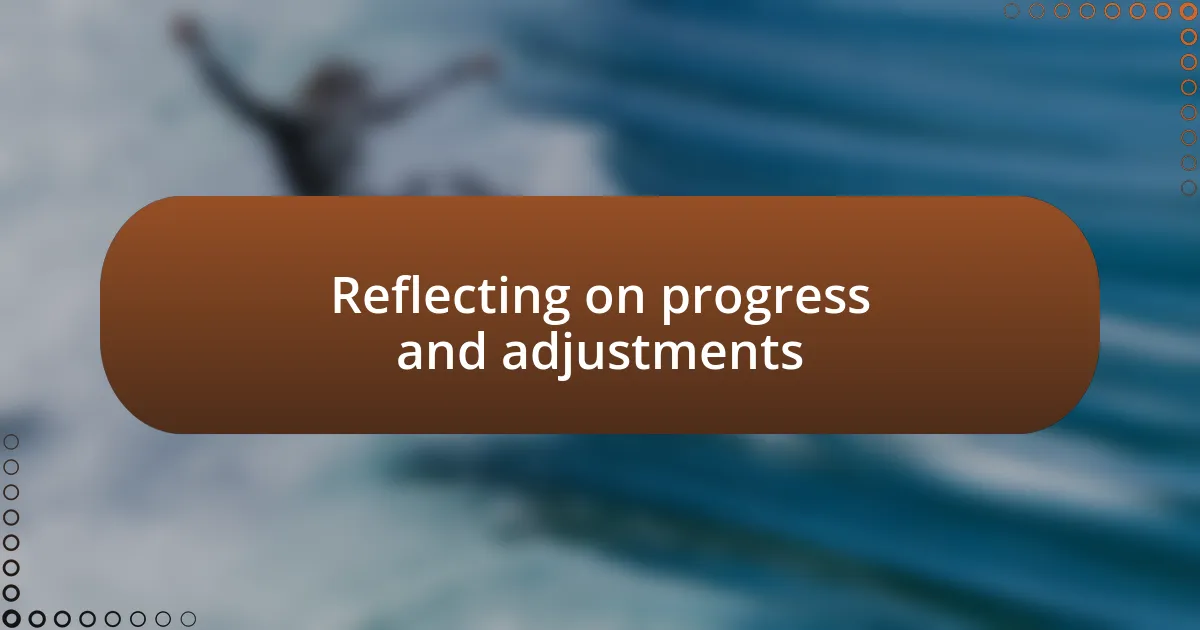
Reflecting on progress and adjustments
Reflecting on my progress has been just as important as the studies themselves. I often kept a journal to document my study sessions and the outcomes. It was enlightening to glance back at entries from months prior, noticing the areas where I struggled and how far I had come. Have you ever taken a moment to review your own learning journey? I found that acknowledging my growth motivated me to continue pushing forward.
Adjustments were crucial in my pursuit of high scores. I recall a period when I relied heavily on rote memorization, thinking it was the key to success. Unfortunately, that approach only boosted my anxiety. Once I recognized this, I shifted my focus to understanding concepts deeply, which made a remarkable difference. It’s a simple question, but it’s powerful: What study methods resonate with you? Finding what truly works can feel like discovering a hidden treasure.
Moreover, I learned to stay flexible in my study routines. I remember a time when a group study session didn’t go as planned, and I felt frustrated. Instead of sticking rigidly to my schedule, I adapted by using that time to review material on my own. This change taught me that sometimes, the best learning experiences come from letting go of expectations. What adjustments have brought you unexpected success? Embracing adaptability has undoubtedly been a game-changer for me.


